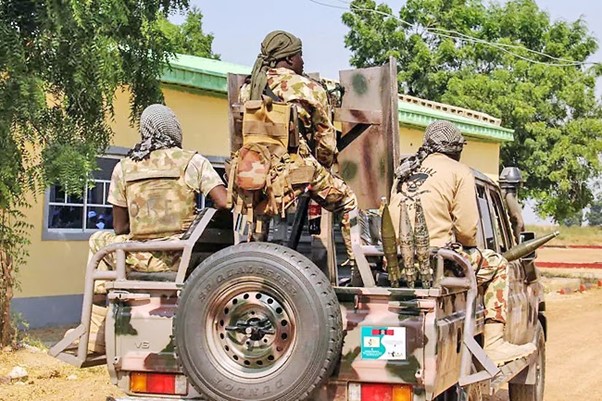Military Approach Has Failed To End Insecurity In Nigeria – Peace Advocates
Some pro-Nigeria activists believed that the military approach to ending insecurity in the country has failed, calling for a civilian approach to the problem.

Peace Advocates of Niger Delta and Northern Region, under the auspices of Foundation For Peace and Non-Violence in Nigeria, have said that the military approach to fighting the escalating insecurity in the country has failed.
The advocates are calling for a total change in the approach to ending insecurity, suggesting dialogue and other civil approaches with the non-state armed groups in order to “save the country from impending cataclysm arising from the present security crisis.”
The Peace Advocates addressed journalists after their one-day meeting in Kaduna, Northwest Nigeria, Monday, March 22.
“The country is awash with terrorism from Boko Haram and Islamic State of West Africa (ISWAP),” said Onengiya Erekosima, Founder/President of the Foundation, as he listed the security woes bedevilling the country.
“To worsen the situation, bandits also emerged, abducting school children, students, raiding villages and killing, maiming and kidnapping innocent Nigerians. Everyday, there is one woe or the other.”
The peace advocates leader maintained that armed herdsmen and the Eastern Security Network (ESN) sponsored by Nnamdi Kanu-led IPOB are compounding the situation, decrying, “with the emergence of Sunday Igboho, insecurity is still counting.”
The peace advocates observed: “In all these developments, it is very clear that the government has been overwhelmed, not knowing what to do. The Nigerian military has been overstretched to a breaking point in containing all these entropy of insecurity.”
“How did we come to this mess? Military confrontation, is it the best solution,” they queried, adding, “If we count our losses, we would know that something is wrong with our approach and there is the need to change our approach.”
They alleged that unemployment, corruption and profligacy on the part of leaders; proliferation of small arms given by political leaders to the youths they employ as thugs, law enforcement agents selling arms to unauthorized persons, as well as the porousness of the country’s borders facilitating the influx of small arms, as the root causes of the insecurity.
“When the situation (of insecurity) escalates, the government resorts to use of the military,” the peace advocates observed, maintaining, “Some of these problems are such that the military cannot eliminate them.”
They remarked: “The approach of containing insecurity with military violence instead of abating, exacerbates it,” underscoring, “So, there to change approach.”
They suggested that the solution to the raging insecurity across the country required dialogue, understanding and civil approach.
Recalling how the dialogue approach contained militancy in the Niger Delta to the point of facilitating safe oil exploration, the peace advocates stated: “It is in this wise that we support every voice calling for the use of dialogue to resolve the present insecurity challenges.”
Support Our Journalism
There are millions of ordinary people affected by conflict in Africa whose stories are missing in the mainstream media. HumAngle is determined to tell those challenging and under-reported stories, hoping that the people impacted by these conflicts will find the safety and security they deserve.
To ensure that we continue to provide public service coverage, we have a small favour to ask you. We want you to be part of our journalistic endeavour by contributing a token to us.
Your donation will further promote a robust, free, and independent media.
Donate Here




